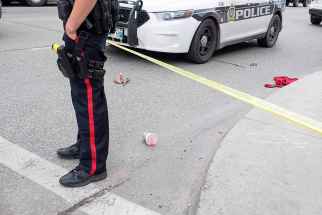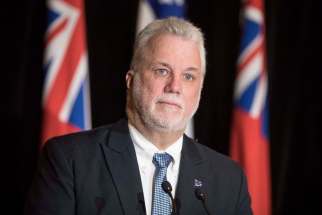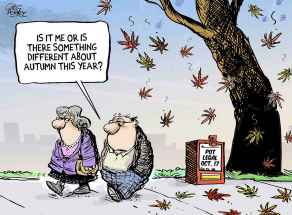Poll suggests ‘widespread anxiety’ on meth in Winnipeg
Read this article for free:
or
Already have an account? Log in here »
To continue reading, please subscribe:
Monthly Digital Subscription
$0 for the first 4 weeks*
- Enjoy unlimited reading on winnipegfreepress.com
- Read the E-Edition, our digital replica newspaper
- Access News Break, our award-winning app
- Play interactive puzzles
*No charge for 4 weeks then price increases to the regular rate of $19.00 plus GST every four weeks. Offer available to new and qualified returning subscribers only. Cancel any time.
Monthly Digital Subscription
$4.75/week*
- Enjoy unlimited reading on winnipegfreepress.com
- Read the E-Edition, our digital replica newspaper
- Access News Break, our award-winning app
- Play interactive puzzles
*Billed as $19 plus GST every four weeks. Cancel any time.
To continue reading, please subscribe:
Add Free Press access to your Brandon Sun subscription for only an additional
$1 for the first 4 weeks*
*Your next subscription payment will increase by $1.00 and you will be charged $16.99 plus GST for four weeks. After four weeks, your payment will increase to $23.99 plus GST every four weeks.
Read unlimited articles for free today:
or
Already have an account? Log in here »
Hey there, time traveller!
This article was published 09/10/2018 (2623 days ago), so information in it may no longer be current.
The vast majority of Winnipeggers feel their personal safety is being put at risk due to the rise of methamphetamine use in the city.
A Probe Research poll, commissioned by the Free Press and CTV, reveals roughly eight out of 10 residents worry the proliferation and popularity of meth on the streets of Winnipeg will put them in personal danger.
!function(e,t,n,s){var i=”InfogramEmbeds”,o=e.getElementsByTagName(t)[0],d=/^http:/.test(e.location)?”http:”:”https:”;if(/^/{2}/.test(s)&&(s=d+s),window[i]&&window[i].initialized)window[i].process&&window[i].process();else if(!e.getElementById(n)){var a=e.createElement(t);a.async=1,a.id=n,a.src=s,o.parentNode.insertBefore(a,o)}}(document,”script”,”infogram-async”,”https://e.infogram.com/js/dist/embed-loader-min.js”);
“Eighty per cent is almost everybody. To get that kind of number is just remarkable,” Probe Research president Scott MacKay said.
“That’s widespread anxiety on this issue. People don’t want to feel that way. The presence of that anxiety, I think, is going to be enough for people to start screaming for answers.”
Respondents weren’t asked if they’re concerned about meth use in the city; rather, they were asked whether they fear it will personally put them at risk.
The response was fairly consistent throughout all areas of Winnipeg and from people of all socioeconomic backgrounds — with some variation.
The highest level of concern was in Winnipeg’s southwest (82 per cent), while the lowest level was reported in the northwest (75 per cent).
Those with a lower socioeconomic status reported feeling most vulnerable. Respondents who earn higher incomes were less concerned. People who make less than $30,000 per year report feeling most insecure (91 per cent); the figure drops to 75 per cent for those who make more than $100,000.
“I’m not sure we should make too much of that, to be honest. My fear is we’ll lose the big picture, which is that practically everyone is concerned. It’s super high among low-income people, and just plain high among everyone else,” MacKay said.
The Probe poll comes at the tail end of a year in which meth has often been in the headlines.
In August 2017, Winnipeg Police Service spokesman Jay Murray told reporters meth had “gripped the city” and was responsible for most of Winnipeg’s rising property crime.

Six months later, in February 2018, police Chief Danny Smyth said the city’s meth problem was getting so bad it was keeping him up at night.
Insp. Max Waddell, who works in the organized crime unit, wasn’t surprised to see the results of the poll.
He says the 11 per cent increase in property crime from 2016 to 2017 is connected with meth use and has “touched people that live in all corners of the city.” In addition, he said the highly addictive nature of the drug pushes use into the open.
“People will do anything to get that next hit of meth and keep themselves high. They don’t care if people are watching them or if it’s out in the open, that draw and desire is so powerful,” Waddell said.
Most of Winnipeg’s meth carries the stamp of Mexican drug cartels. Police believe the drug is smuggled into Canada’s West Coast, before being shipped to other provinces.
Compared with other drugs, meth poses a greater risk to police and residents because users become unpredictable, Waddell said.
“Methamphetamine causes people to come into a state of psychosis, where they really lose control. The simplest trigger or stimulus can cause people to act in a very violent or aggressive manner,” Waddell said.
“This isn’t something we’re going to be able to arrest our way out of. Those who are addicted to this drug need help.”
Mayor Brian Bowman admits the meth crisis is a significant challenge for the city, but stresses it isn’t unique to Winnipeg.
He points to the WPS illicit drug strategy and the proposed Bruce Oake Recovery Centre as being among recent efforts to help tackle the problem.
“This isn’t something we’re going to be able to arrest our way out of. Those who are addicted to this drug need help.”–Insp. Max Waddell, who works in the organized crime unit
The mayor also wouldn’t rule out the possibility of setting up a supervised injection site, saying “all options need to be kept on the table,” with no potential solutions ruled out for “ideological reasons.”
Bowman said if he’s re-elected Oct. 24, he’ll spearhead a task force that would include representatives from the municipal, provincial and federal governments.
His main challenger in the municipal election, Jenny Motkaluk, said the results of the poll are an indictment of Bowman’s leadership over his first term in office. She doubts Bowman has the ability to address the problem and points to her recent campaign promise of a meth task force as something that would make a tangible impact.
“Brian Bowman and his administration are going to be judged on their results. We have seen four years of significant upticks in violent crime and property crime in the city. All of this happened on Brian Bowman’s watch,” Motkaluk said.
Given the poll results, MacKay said it’s no surprise mayoral candidates have made tackling the meth problem a central plank in their election platforms.
“I’m certainly not an expert when it comes to methamphetamine,” MacKay said, “but from a public opinion perspective, these numbers are just remarkable.”
ryan.thorpe@freepress.mb.ca
Twitter: @rk_thorpe
The Winnipeg Free Press/CTV News Winnipeg poll
From Sept. 19 to 28, Probe Research surveyed a random and representative sampling of 653 adults who live in Winnipeg.
Modified random digit dialing, including both landline and wireless numbers, ensured all Winnipeg adults had an equal opportunity to participate in this Probe Research survey. A CATI-to-web approach was employed, whereby a live-voice operator or interactive system randomly recruited respondents by telephone, inviting them to complete the survey via a secure online questionnaire. In addition, 150 randomly recruited Probe Research panel members were included in this general population adult sampling.
With a sample of 653, one can say with 95 per cent certainty that the results are within ±3.8 percentage points of what they would have been if the entire adult population of Winnipeg had been surveyed. The margin of error is higher within each of the survey’s population sub-groups.
Minor statistical weighting has been applied to this sample to ensure that age and gender characteristics properly reflect known attributes of the city’s population.

Ryan Thorpe likes the pace of daily news, the feeling of a broadsheet in his hands and the stress of never-ending deadlines hanging over his head.
Our newsroom depends on a growing audience of readers to power our journalism. If you are not a paid reader, please consider becoming a subscriber.
Our newsroom depends on its audience of readers to power our journalism. Thank you for your support.
History
Updated on Tuesday, October 9, 2018 6:12 AM CDT: Corrects spelling of Bruce Oake Recovery Centre
Updated on Tuesday, October 9, 2018 11:44 AM CDT: Changes headline









